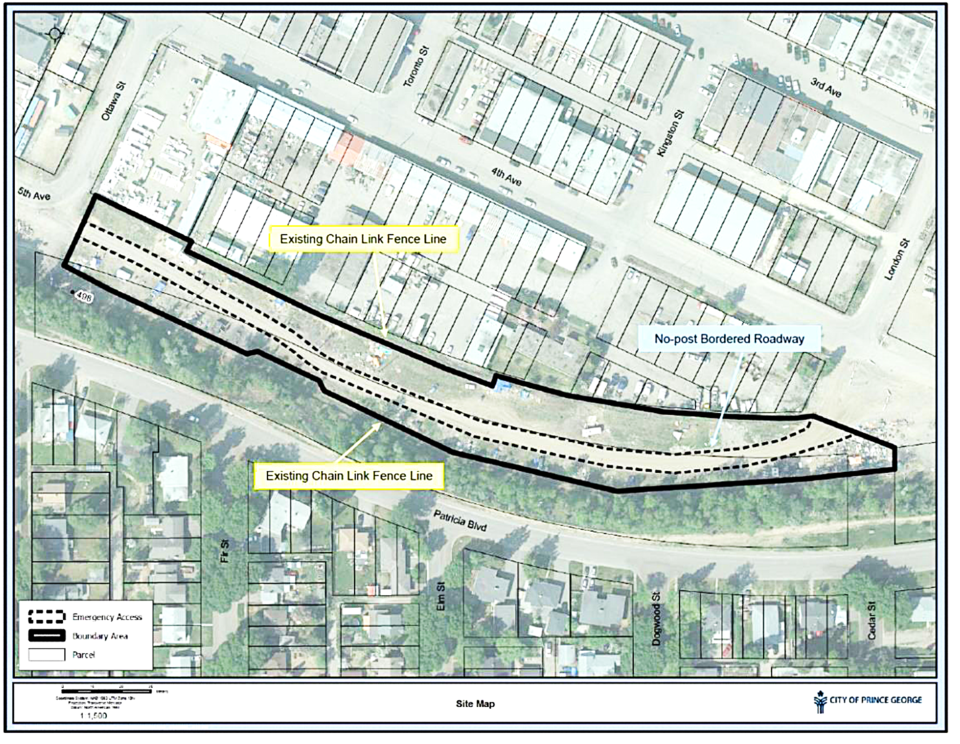The city is putting up a new perimeter fence around Moccasin Flats.
The chain-link fence will legally define the location of what's also known as the Lower Patricia Boulevard Encampment, which has expanded eastward since the B.C. Supreme Court ruling in October 2021 that allowed it to remain open until suitable housing and daytime facilities were available.
The encampment was vaguely referred to in that ruling as a “green space at the end of Fifth Avenue.”
In a report to council discussed at Monday’s public meeting at city hall, administration recommended the fence be reestablished on the east, west and south boundaries, not as an immediate attempt to move people out of the camp, but as a way for city staff to engage with residents currently camping outside the boundaries and encourage them to move voluntarily into the area within the fence.
Most of that perimeter fencing is already in place.
Council acknowledged the existing fence is cut regularly by residents to allow easier access but agreed to fund the as-yet-undetermined cost to secure the property. The city will also establish signs in the camp which outline expectations for the residents and reinforce existing bylaws.
The report stems from the May 28 town hall meeting and open house on community safety, held at the Prince George Conference and Civic Centre, which drew 220 people.
Public participation included 40 feedback forms, 20 emails sent to the city website, 94 questions submitted online through the Slido app and 43 questions/comments received at the forum.
Questions raised at the town hall centred on housing, encampments and air quality from campfire smoke and campsite structure fires. Those were the most common discussion topics in the public submissions.
In response, administration recommended the city and its partners continue to build supportive housing capacity and provide suitable daytime facilities and low-barrier housing for community members in need of those services. That includes B.C. Housing’s work to convert the former North Star Hotel at 15th Avenue and Victoria Street to low-barrier housing and the city’s transitional shelter facility now under construction at 397 Third Ave., slated for completion in the fall.
Eric Depenau, the city’s director of administrative services, reported to council there are now 550 supportive housing units in the city, including 349 that are now open and 107 available later this year, with 27 slated to open in 2025.
Building capacity in the community will allow the city to demonstrate to the B.C. Supreme Court that it is meeting conditions to support the transition of Moccasin Flats residents to other forms of housing, including the possibility of temporary overnight sheltering being permitted in designated areas. That next phase of the city’s management of the site could be achieved by as early as October.
Once that happens, the city plans to secure the campsite, clean the area and will prevent future occupation in areas not designated for temporary overnight sheltering. Moccasin Flats will be included in the review of parks and open spaces where the city might allow sheltering. The transition will not occur until after the city receives a court order and has exhausted efforts to offer housing to occupants. That could occur by as early as the first quarter of 2025.
Until the existing camp is closed, the city will step up its cleanup efforts, especially in cases in which one of the camp structures have burned and staff will continue to remove destroyed or abandoned structures. Based on the success of the April cleanup at Moccasin Flats, supported by community members, and the positive feedback received by the city, a second community cleanup is being discussed.
In the final phase, the city will work with community partners to forecast needs and build capacity to address changes in the community and will be proactively trying to prevent any campsites from becoming entrenched. That will help the city address air quality complaints from nearby residents in the Millar Addition and Connaught neighbourhoods.
To promote coordination of partner agencies the city will devote existing staff resources to the Community Safety Hub which will issue quarterly updates on management of social issues. The city will engage in public safety discussions with Lheidli T’enneh First Nation, Regional District of Fraser-Fort George, B.C. Housing and Northern Health.
City manager Walter Babicz recommended that any planning for regular town halls be deferred to the strategic planning sessions in September and council agreed to set a schedule in late October for the twice-a-year public consultations.









